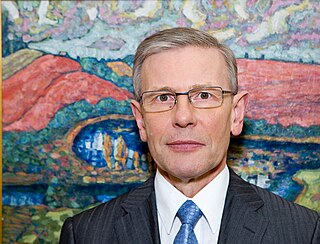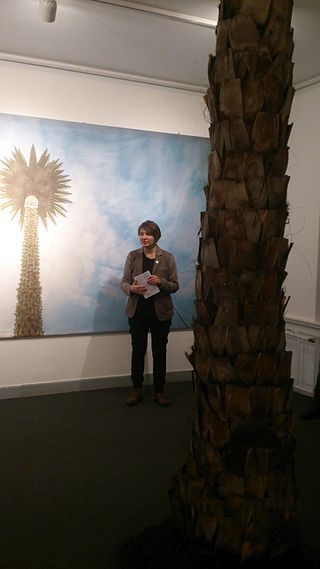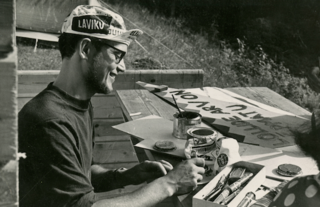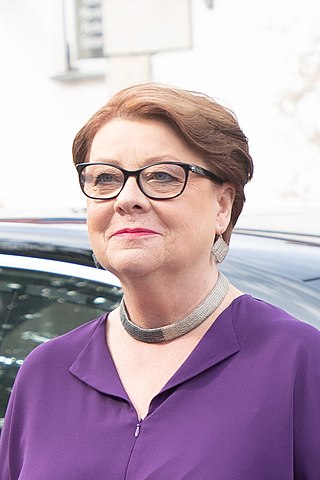
Rael Artel (born February 11, 1980) [1] is an Estonian art writer, curator and gallerist. Since 2013, she has been the director of Tartu Art Museum in Estonia. [2]

Rael Artel (born February 11, 1980) [1] is an Estonian art writer, curator and gallerist. Since 2013, she has been the director of Tartu Art Museum in Estonia. [2]
Rael Artel graduated from Estonian Academy of Arts in 2003. In 2004–2005 she studied curating in De Appel Art Center in Amsterdam. [3] In 2009 she defended her M.A. thesis on criticism of nationalism in the Eastern European art in 2000–2008 in the Estonian Academy of Arts. [4]
From 2004 to 2009, Artel owned an independent art gallery named Rael Artel Gallery: Non-Profit Project Space. In 2004–2008, it was based in Pärnu, while from March 2006 to January 9, 2009 it had a branch in Tartu, in the building of Tartu City Library. [3]
In 2007 she initiated a project called Public Preparation, a networking and knowledge collection platform for modern European art. Since 2008, exhibitions and seminars have been held using that framework. [3] [5]
In 2010–2015, Rael Artel was the artistic director of ART IST KUKU NU UT, an annual festival of modern art held in Tartu. She has also held lectures in the Estonian Academy of Arts. [6]
In March 2013, Artel became the director of Tartu Art Museum. [2]
Since 2000, Rael Artel has been a curator in Estonia, Warsawa, Lisbon, Amsterdam and New York City. Amongst those are Let's talk about nationalism! Between Ideology and Identity in Kumu (2010), Lost in Transition in Contemporary Art Museum of Estonia (2011), Art Must Be Beautiful. Selections by Marina Abramović in Tartu Art Museum (2011), Life in the Forest in Arsenal Gallery in Białystok (2011), After Socialist Statues in the modern art center KIM? in Riga (2011), Explosion in Pärnu and Old News in Kumu as part of the exhibition Archaeology and the future of Estonian art scenes (2012), Marge Monko 's How to Wear Red? in Tartu Art Museum (2013) [6] ning My Poland. On Recalling and Forgetting in Tartu Art Museum (2015). In 2012, Rael Artel and Kaisa Eiche (:et) were curators for an exhibition of the most scandalous works in modern Estonian art MÖH? FUI! ÖÄK! OSSA! VAU! in Tartu Art Museum. [7]
In January 2016, Rael Artel was awarded the annual Cultural Endowment of Estonia for her work as a curator and as a museum director. [8]

The Estonian National Museum founded 1909 in Tartu is a museum devoted to folklorist Jakob Hurt's heritage, to Estonian ethnography and folk art. The first items for the museum were originally collected in the latter part of the 19th century.

Mall Nukke is an Estonian artist. A printmaker by training, she is primarily known for her paintings, collages and installations influenced by pop art. Mall Nukke emerged on the Estonian art scene in the early 1990s, her work at the period can be seen as commentary of nascent mass culture and consumer society in newly independent Estonia. Her early collages combined various cultural references and created new media characters based on real entertainers and public figures. Since the 2000s, Mall Nukke has concentrated on creating photo-manipulations and mixed media paintings inspired by Eastern Orthodox icon art.

Enn Kunila is an Estonian entrepreneur and art collector.

Liis Koger is an Estonian painter and poet based in Tallinn.

Karin Aasma was an Estonian-Swedish art historian.

My Poland. On Recalling and Forgetting is the first Holocaust-themed art exhibition in Estonia, taking place at Tartu Art Museum in early 2015, seventy years after the end of World War II and the liberation of the Nazi extermination camps.

The Tartu Art Museum is a state-owned museum of art located in Tartu, Estonia. It was founded in 1940 on a private initiative by the members of local art school Pallas. This is the largest art museum in Southern Estonia.
Nikolai Voldemar Triik was an Estonian Modernist painter, graphic artist, printmaker and professor. His work displays elements of Symbolism and Expressionism.
Herta Elviste, was an Estonian stage, film and television actress and assistant theatre director whose career spanned nearly seventy years.

Rita Raave is an Estonian stage, television and film actress, and painter.
The 2018 Meistriliiga was the 28th season of the Meistriliiga, the highest division of Estonian football system. The season was scheduled to begin on 25 February 2018, but was postponed due to a cold wave. On 3 March, the season began with four out of five second round matches held in indoor arena. This marked the first time Estonian league football was played indoor. The season concluded on 10 November 2018. Flora were the defending champions. Nõmme Kalju won their 2nd Meistriliiga title completing an entire season undefeated.

Kaarel Kurismaa is the first and one of the most important sound art and sound installation artists in Estonia. His work also expands into the field of painting, animation, public space monumental art, stage installations. In Estonian art history, Kurismaa’s significance lies mostly in the pioneering work with kinetic art and with keeping its traditions alive. Kurismaa stands as one of Estonian sound art scene’s central icons. His idiosyncratic work serves as a foundation for Estonian sound and kinetic art.

Museum of New Art, Pärnu is an art museum / art gallery in Pärnu, Estonia. Museum's director is Mark Soosaar.

Maarja Jakobson is an Estonian television, stage and film actress whose career began in the late 1990s.
Heini Paas was an Estonian art historian.

Krista Piirimäe is an Estonian art historian.

Märt Põder is an Estonian philosopher, freedom of information activist, presenter, publicist and translator.

Sirje Karis is an Estonian museologist who has been the spouse of the president of Estonia since October 11, 2021.